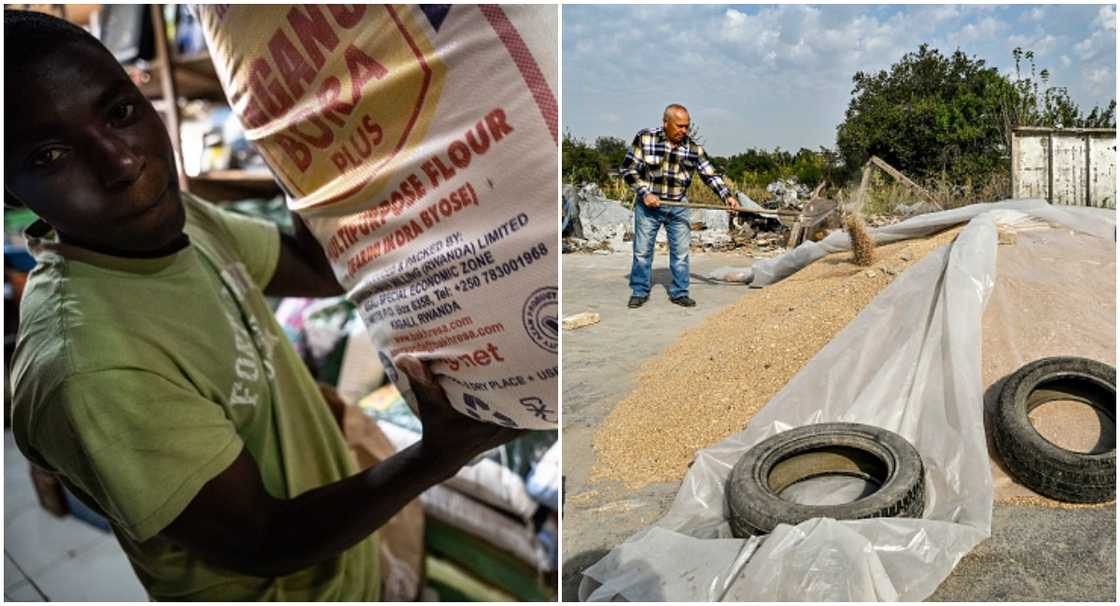Russia Bombs Ukraine`s Grain Stores: Ghana And Other African Countries Face Imminent Price Hikes
- Russia has launched airstrikes on Ukraine's grain storage facilities at Black Sea Port in Odesa, destroying tonnes of the country's grain
- The incident is expected to adversely affect Ghana's food security and destabilise food prices on the continent in general
- Many African countries heavily rely on grain supply from Ukraine to meet their market demand that local production has failed to meet for decades
PAY ATTENTION: Be the first to follow YEN.com.gh on Threads! Click here!
On September 25, Russia launched airstrikes on Ukraine's grain storage facilities at the Black Sea Port in Odesa, destroying tonnes of the country's grain and triggering concerns about food security in Ghana and the rest of Africa.
"The attack resulted in the destruction of grain storage facilities and significant damage to the seaport," Ukraine's Economy Minister Yulia Svyrydenko said on X.
Already, per recent reports, Ukraine has lost nearly 15% of its grain storage capacity following Russia's invasion, greatly affecting its role as a key food supplier to the world.

Source: Getty Images
According to a new report by the US government-backed Conflict Observatory, Russia has seized 6.24 million tonnes worth of food storage capacity, and another 2.25 million tonnes of capacity in Ukrainian hands had been destroyed.
PAY ATTENTION: Follow us on Instagram - get the most important news directly in your favourite app!
In total, the Russian invasion of Ukraine has removed around 8.5 million of Ukraine's 58-million-tonne storage capacity, threatening the country's future ability to get crucial supplies of wheat, corn and sunflower oil to the world market, according to the report.
"Russia and Russia-aligned forces' damage and seizure of Ukrainian crop storage capacity threaten to turn Ukraine's current agricultural crisis into a catastrophe," the report said.
Africa's huge dependence on Ukraine grains
The war in Ukraine and the damage to its grain storage facilities by Russia has taken a heavy toll on food prices in Ghana and other sub-Saharan African states already reeling under high inflation.
Ghana’s inflation has been rising steadily since last year, hitting 40.1 % in August 2023, the highest in three decades.
Economist Dr Patrick Asuming has told YEN.com.gh that there is a chance that Ghana might see some marginal impact in the form of increases in the price of some grains.
"The problems which we have had since the Russian-Ukraine war are still ongoing. I think the bombing of the silo will be a minor appendage to that.
"There will be an impact at the global level. It is coming when some countries are taking protection measures to protect their own farmers or grains. India has recently banned the export of some rice grains," he said.
In 2020 and 2021, Ghana’s wheat imports from Eastern Europe were estimated by the United States Department of Agriculture at 990,000 metric tons. This has grown historically at an average of 5% per year.
Also, according to the 2022 World Bank Africa Pulse report, Ghana imports about 33% of wheat and a little above 20% of fertilizers from Eastern European countries, ranking it among African economies with high dependence on grains from the region.
The report explained as follows:
“About one-third of the wheat imported by the region comes from the two Eastern European countries. The countries with the highest exposure to wheat trade from Russia and Ukraine (when considering jointly their share in total wheat imports, total cereal imports, and total imports) are the Democratic Republic of Congo, the Republic of Congo, Uganda, Ethiopia, and Mauritania.
"Large countries in the region also have moderate to high exposure to wheat imports from Russia and Ukraine, such as Kenya, Ghana, Mali, and Nigeria."
The report also emphasised that the impact of the Russia-Ukraine war on commodity prices has compounded existing challenges in global food markets, including increasing prices and tightening supplies.
For Dr Asuming, especially in Africa where a lot of people depend on the import of rice from the Russia-Ukraine area, Russia bombing Ukraine grain stores would take a major toll
"If they are not getting rice from other parts of the world and this bombing reduces the number of grains on the world market, that means people are facing higher food prices," he told YEN.com.gh.
Did Black Sea Grain Initiative help?
Ghana and other African countries breathed a sigh of relief when the UN brokered the Black Sea Grain Initiative in July 2022 in which Russia agreed not to block Ukrainian grain from reaching African markets.
By March 2023, Ukraine had delivered 140, 000 tonnes of wheat to Africa under this agreement.
However, Russia pulled out of the deal in July throwing African countries under the bus.
"Food prices were stabilising following that agreement. However, the recent move by Russia to pull out means the shipment of wheat from Ukraine to Africa at large will face challenges and this will definitely have an adverse impact on the prices of food," Kenyan Economist, David Omenya told Nairobi-based TUKO.co.ke.
Monday's attack on Ukraine's grain storage facilities could point to Russia's determination to stop food shipments from Kyiv to other countries, particularly Africa.
“Our only hope is that Russia stops the invasion and allows shipments of grain and food products from Ukraine," said the economist.
Solutions exist to overcome a creeping crisis amid Russia-Ukraine war
Meanwhile, YEN.com.gh reported in a previous story that it has been a madhouse on the global front since the Russia-Ukraine war kicked in.
But while global mitigation measures seem to be restoring order, the heavy shocks of the war on the food security in Ghana and the rest of Africa remain very much intact.
YEN.com.gh spoke to experts on dealing with a dire problem.
New feature: Сheck out news that is picked for YOU ➡️ click on “Recommended for you” and enjoy!
Source: YEN.com.gh






